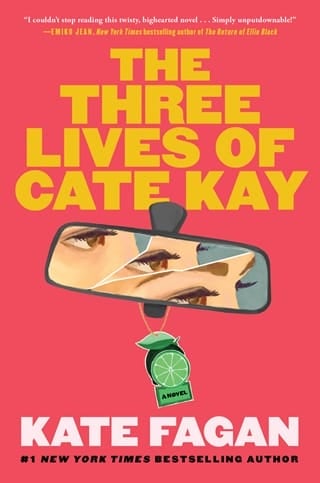Chapter Thirteen
No one told Nancy what went on at Tuckahoe, and she didn't ask. She felt removed from everything and everyone. In Williamsburg, she was almost happy. She could almost believe none of it had ever happened. Or that it had happened to someone else. Not to her. Not to them. Except, of course, it had. She saw it in Dick's eyes on the rare moments he looked at her. She saw it in the frown lines on her sister's face. She saw it in Phebe's eyes when she sat at her glass and watched as she curled her hair. She felt it in her body. How could she not? In the early days after Glentivar, she thought she'd never hold a child without tears streaming down her cheeks. But Saint's sweet innocence soothed her, and in Williamsburg, she could escape painful memories, spending time with the children of the house — Dick's youngest half-siblings, Lelia's children, and of course, Saint.
Her nephew, now eight months old, sat, smiled, laughed and sometimes cried like any other boy of his age might. He interrogated the world through his mouth, grabbing anything within his reach — a fistful of his fond aunt's hair, a brooch pinned to her dress, his rattle, the blanket he had grown so attached to — rubbing each with his lips and tongue in messy exploration. He was strong, they all said so, admiring the grip that clutched at their fingers or at his spoon as he took to solid food with hearty enthusiasm. He was a handsome fellow too, with fat, pink cheeks and a shock of brown curls that his mother, aunt and Lelia could not resist touching. Eyes softened when they saw him. Mr. Tucker sat with his little namesake in the garden, bouncing him on his knee and singing soft lullabies until the sun fell behind the rooftop and the cold chased them back indoors.
But what use were lullabies if the child could not hear them? Nancy saw the signs. He didn't turn his head when someone entered the room. His face lit up when his mother appeared in his line of sight, but he didn't stir at the sound of her voice. He didn't react to clapping, although he had learned to clap himself, copying Lelia's daughter, who spent hours with the baby, sitting on the floor with him, telling stories with her dolls and playing peekaboo with her hands. Loud noises rarely disturbed him. Once, a serving girl dropped an empty tin bucket on the hearth just feet from where Saint sat banging on a toy drum. The child was startled and dropped the drumstick in his fist. Hope fired in Judy's eyes, but Nancy didn't see it the same way. Saint's reaction was delayed, more likely a consequence of Judy's own sudden movement as she heard the noise. There was no evidence of Saint hearing anything that went on around him, and what the implications were — well, no one, as yet, was prepared to discuss it. Judy's plan, according to Nancy's observation, was to pray for a miracle. Much good that would do.
Daily life in Williamsburg was easier than at Bizarre, never mind that there were so many in the household. Nancy felt time slow. She slept better and grew stronger, at least in her body. In Williamsburg, she closed her mind to the past and resigned herself to a future that would take care of itself. She dreamed of her mother and sometimes was surprised to wake up, not at Tuckahoe, in her warm bed with her sister by her side, but in a small room in Mr. Tucker's house with wagons rolling along the cobbles beneath her window, the clatter of horse hooves and shouts and giggles from the nursery next door.
She saw next to nothing of Dick and Mr. Tucker. She asked no questions, but all three women knew the men were as concerned as ever. One day, Lelia reported that Mr. Tucker believed that more than a miracle was needed to drag the family out of the havoc wreaked by the October visit to Glentivar. Judy had broken down and cried. Nancy looked on, feeling wretched, saying nothing. Both Tucker and Dick were, by nature, drawn to action, rather than reaction, and after the visit to Tuckahoe, they spent long evenings huddled together in Mr. Tucker's study, leaving the women to read or sew in the parlor, each privately speculating, but saying nothing, about what their menfolk might be about to do.
Everything changed in the middle of March. Dick announced they would leave the Tuckers and travel to the family's house at Matoax. If a return to Bizarre was discussed, Nancy was not party to it, nor was her opinion on the matter sought. The feeling she had experienced in Williamsburg — that strange, dislocated sense of being suspended, as if by some unseen threads, between what had been and what would come — continued at Matoax.
And then, at the end of the month, Dick penned a public letter. It was time, he declared, to resolve the matter. Once and for all.
* * *
TO THE PUBLIC
March 29, 1793
My character has lately been the subject of much conversation, blackened with the imputation of crimes at which humanity revolts, and which the laws of society have pronounced worthy of condign punishment. The charge against me was spread far and wide before I received the smallest notice of it — and whilst I have been endeavoring to trace it to its origin, has daily acquired strength in the minds of my fellow citizens.
To refute the calumnies which have been circulated, by a legal prosecution of the authors of them, must require a length of time, during which the weight of public odium would rest on the party accused, however innocent — I have, therefore, resolved on this method of presenting myself before the bar of the public.
Calumny to be obviated must be confronted — If the crimes imputed to me are true, my life is the just forfeit to the laws of my country. To meet and not to shrink from such an inquiry as would put that life in hazard (were the charges against me supportable) is the object of which I am now in pursuit.
I do, therefore, give notice that I will, on the first day of the next April, Cumberland court appear there and render myself a prisoner—
Judy threw the paper on the table and covered her face with her hands. "Dick! You can't mean to publish this? It's insanity."
"Far from it."
She continued reading. "What do you mean here? ‘Let not a pretended tenderness toward the supposed accomplice in the imputed guilt shelter me. That person will meet the accusation with a fortitude of which innocence alone is capable.'"
"It means what it says. Your brother, William, will not meet me. Yet he and others let this slander spread, all the while pretending deep concern for Nancy. I'm not supposed to clear my name in case it further injures hers. That was your family's message to me. Well, Tucker and I have determined it will not serve. We must pull clear of this, Judy."
His voice cracked, and Dick threw himself into an armchair in their Matoax parlor.
The room was cold enough that Judy saw her breath on the air. "When will this become known?"
"It will appear in tomorrow's Gazette. Your sister will be protected if I stand forward to answer the rumors and prove them unfounded. Tucker and I have it all worked out. In a month, we'll be back at Bizarre where we belong. I hate this house."
Time and again, she had shown him in word and action that she supported him. She had never demeaned herself or him by asking Nancy about Glentivar. She had never questioned Nancy's girl, Phebe, who was as close with her mistress as any slave girl Judy had ever known. True, she'd thought of doing so, but the idea was as quickly dismissed as it was conceived. The girl's word meant nothing, would serve them no purpose and therefore was without value. Besides, even asking her admitted a level of doubt in Nancy and Dick that Judy's mind revolted against. She forced herself to stay in the moment and concentrate on her husband's words. Was she supposed to contradict him? Judy had no love for Matoax either.
"Why do you hate it here?"
"It's full of the dead, Judy. Can't you feel it? They are all here — Father, Mother, Theo."
His parents. His brother. Not their child. Dick's list of losses was incomplete. She swallowed the words that rose in her throat, tasting a disappointment in him that had grown so familiar she almost welcomed it. The death of the child had become something Judy understood as only hers. Returning to Matoax returned the loss she had experienced in full force. Even as she fussed and prayed over Saint, even as she prayed for the new child she hoped to deliver, always, she clung to that loss. Remembering the first child, when everyone around her seemed to have forgotten, that was her duty, the responsibility of parenting that Judy now relished. A little girl. Born still, but she had not always been still. Only Judy had experienced that. Dick didn't share her grief, and his failure to remember, or care, bitter though it was, proved she was right.
"As if the loss of my brother has not been enough for myself and Nancy to contend with," he said.
"Nancy? Why Nancy?" Judy drew in a breath, and the cold air stung her teeth.
"Weren't you the one that said Theo and she would marry?"
"Perhaps they should have. Then none of this mess—"
"Mess?" Dick pressed his fingers into his eyelids. "What kind of word is mess to describe this hell? Have you any idea of what I'm going through? My honor, my reputation, all at risk. What would my father think? Or my mother? Finding myself at the mercy of tattling slaves and malicious, jealous men like your sniveling brother. Forced to submit to your father's scorn. Accused of killing a newborn, Judy! An infant. I am sick to my stomach from dawn until dusk. This is not a mess! This is an open wound in my chest! And while you might lock up your feelings and pinch up your face and stopper your ears and eyes to what is happening to me, I am not so stiff. Not so cold and unfeeling. Good God, what kind of woman are you?"
He jumped to his feet and towered over her. When she shrank back, it only seemed to anger him more. Disappointment, revulsion, scorn stormed across his face, and she panicked.
"Dick!" She reached for his hand. He pushed it away. He strode to the door but paused in the doorway. When he spoke, his voice was cooler.
"For better or worse, Judy. We are man and wife. And whatever our failings, we are all each other has, or can have in this life. Let us not make it any worse than it already is. Find it in yourself to understand what I am dealing with. Support me. You are my wife. I'd like you to act like it."
* * *
A short distance away, across the hall, Nancy rocked on the balls of her feet. She had been considering what tasks she might get done before dinner. It was how she made her way through each day — keeping busy, not thinking. Now, Dick's words hammered her ears like nails into wood. We are all each other has, or can have, in this life . . . understand what I'm dealing with . . . support me . . . my wife . . . act like it.
Saliva pooled on Nancy's tongue. She must swallow, or gag on it.
 Fullepub
Fullepub 



